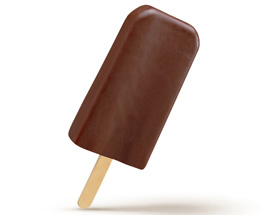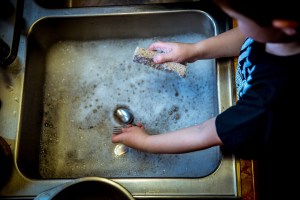My Bicycle, an Ice Cream Truck, and a Nickel
Hello, I’m a military brat.
Growing up, I never knew what my father’s next assignment would bring. One morning he’d be gone and a few months later we’d be in a new home across the country, or overseas. Uniforms hung in the closet like artwork in a gallery, from camouflage fatigues to flight suits to full-dress blues. His military career was a part of my upbringing, defining who we were as family.
One of the most terrifying experiences I had as a military brat involved my bicycle, an ice cream truck, and a nickel.
My story would make a wonderful object lesson for your children or grandchildren. I guarantee if you hold up a nickel between your thumb and pointer finger, make sure the children can see it, and look at it from time to time while reading my below story, you’ll have them washing their hands and not putting coins in their mouth. You’ll even wash your hands more often after handling change.
Go ahead, have your children and grandchildren gather around and tell them my story —
The seductive serenade of the ice cream man’s music blasted over a public address system mounted on his truck’s roof. One large speaker pointed forward with the music temptingly calling, “Here I come. Get your parents to give you some money.” The second positioned to trumpet to the homes and people he had just driven past letting them know, “Hurry, it’s not too late. You know you want it!”
Like the moth drawn to the flame, I started dancing and crying out, “Oh please, mother. It’s the ice cream man. Can I have a nickel? Please, please, pretty please?”
Ice cream bars on a stick cost only five cents back in 1960.
“Jim, a nickel’s a lot of money,” mother said.
“He’s passing our house! I’ll take out the trash,” I pleaded, and bargained at the same time. “Can I? Please?”
She pulled a quarter from her purse. “Get four of the fudge ones,” mom said as she tossed me a quarter. “Bring me back the nickel he will give you as change for giving him the quarter.”
I raced out the front door, jumped on my bicycle and pedaled fast to catch up with the pink truck carrying the sweet treats.
I made the purchase.
Grasping four ice cream bars in one hand and my nickel change in the other, I knew I had a problem.
I was two blocks from home with my ice cream in one hand, a coin in the other and a bicycle to ride back home.
I had to get back fast as the temperature was 115 degrees at Luke Air Force Base, Arizona, where I lived. It was over 120 degrees when on the concrete or asphalt. My seven years old mind churned out what I believed was a solution.
Putting the nickel in my mouth, I climbed on the bicycle, and clutched two ice creams in each hand, gripping their wooden stick and the handle bar. Somehow, I made it home okay.
I tossed down the bike, ran into the house carrying my four prizes.
Then it happened. As I spoke, I gagged on the nickel. Well, I started choking on it before I swallowed it.
Mother yelled for dad and my little brother.
She grabbed me and next thing I knew, I was in the emergency room at the Luke Air Force Base Dispensary. As we entered the building, she begins explaining what happened.
They took me for x-rays. I still vividly remember the picture where it looked like the nickel was sitting on my rib.
The doctor explained the nickel may pass through my digestive system during routine bowel movements in the next one to three days. He told how I would need to squat over a newspaper when I had a bowel movement. That way I could use a stick (he handed me a handful of tongue depressors) to check the feces for the nickel.
If I didn’t pass the nickel in four days, they would do surgery! Yikes. They would cut me open to remove the nickel.
For the next three days, every time I went to the bathroom, my then five-year-old little brother would come with me, looking at my bottom as I did my deed. On the third day, he started screaming, “There it is, there it is!” as he could see the nickel.
I was relieved, as were my parents, that I wouldn’t face surgery.
What about the ice cream bars?
They melted on the kitchen counter. In my parents’ haste to get me to the emergency room, no one thought of putting them in the freezer.
Whenever I see an ice cream bar, I often remember the ice cream man, my bicycle, and a nickel.
Since then, I never put coins in my mouth, and I always wash my hands after touching coins. I know where the coins have been!
And what happened to the nickel?
I washed it soapy hot water. Mother made me scrub it.
The next Sunday I placed it in the offering plate at Sunday school.
All the children knew about that nickel’s traveling adventure.
One girl said that the soapy hot water only was the first washing of the nickel. Giving it to Jesus it now would be super clean.
“Why?” asked my friend Doug.
“It’s going to Jesus for the cleansing power. It’ll be washed in the blood of the Lamb,” she beamed.
“What?” ask Doug.
“Oh, silly,” she said, “Don’t you remember the song we sing in big-church? ‘Are you washed in the blood of the Lamb?’ That nickel’s going to be spotless, as clean and shiny white as snow.”
“Come now, let us reason together, says the Lord: though your sins are like scarlet, they shall be as white as snow; though they are red like crimson, they shall become like wool.”
Isaiah 1:18 ESV
Note: For several years I’ve been writing short vignettes about growing up as a military brat. I plan a memoir about growing up as a military brat during the cold war threat of the 1950s and 1960s.
Like this:
Like Loading...
Like this:
Like Loading...













 steeple of one church I served and had my HAM rig in my office at three churches I served. For years, actually decades, I was also a National Weather Service Skywarn Certified Weather Spotter – a storm chaser.
steeple of one church I served and had my HAM rig in my office at three churches I served. For years, actually decades, I was also a National Weather Service Skywarn Certified Weather Spotter – a storm chaser.






